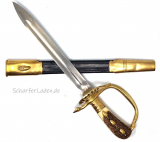Weyersberg, Kirschbaum
Weyersberg, Kirschbaum
Weyersberg, Kirschbaum & Cie
Tradition since 1573
1560 The history of Weyersberg, Kirschbaum & Cie (W.K.C.) in Solingen goes back to the Middle Ages, when one of the first trademarks of its kind for swords was registered by the famous blacksmith Johannes Wundes in 1560: the "Königskopf". It is one of the longest-used trademarks in Solingen to this day.
1573 In the 16th century the art of swordsmithing was already well developed in Solingen and Wilhelm Weyersberg, ancestor of the WKC founders, became mayor of Solingen in 1573. During this time the "Solingen Method" was already developed, a kind of division of labor organized by guilds. For example, the forging, hardening, grinding and polishing of blades were not performed by the same workers, but were strictly separated.
This specialization gave Solingen a reputation for excellent blades even in this early period. The quality of the blades was so recognized that the name "Solingen" grew to become an internationally known trademark.
1850 In the age of industrialization, the Weyersberg family became the most important factor in the production and trade of blades in Solingen.
One reason for this success was the invention of a blade forging roll in England. This patent was bought by Fritz Weyersberg and the roller was used for the first time in Solingen.
With this machine, Fritz Weyersberg was able to produce many times the normally feasible quantity of blades.
1854 But another family also gained great influence in Solingen during this period: The Kirschbaum family, who had made a good name for themselves worldwide by trading Solingen blades. The second registered trademark of the WKC company, the so-called knight's helmet, dates from this time.
1883 The Weyersberg and Kirschbaum companies merged in 1883 to form Weyersberg, Kirschbaum and Cie. (WKC), the strongest company in Solingen at that time. The two trademarks Ritterhelm and Königskopf were merged and from then on stood for excellent quality products from WKC.
The workforce quickly grew to over 1200 men by 1900 and the production of blades was expanded to include complete weapons, bicycle parts as well as motorcycles and car parts.
It was no coincidence that the first two telephones in Solingen, numbered 1 and 2, belonged to Weyersberg, Kirschbaum and Cie.
WKC single-mindedly expanded its world market leadership for bright weapons and supplied countless blades, bayonets, sabers and epees as well as other metal products worldwide. WKC produced over 100000 saber blades annually and also supplied other companies, such as Wilkinson Sword in England, which was founded with the help of WKC owner Kirschbaum. Many bright weapons from this period can be found in museums around the world today.
01.07.1887 Rudolf Kirschbaum together with a business friend founds the famous Wilkinson Sword Company in England, which today is one of the most important manufacturers of razor blades.
1922 In 1922 WKC was taken over by a supplier, the Siegen-Solinger Gußstahlverein, and went under with them in the economic crisis. However, the name WKC continued to exist and loyal customers willing to buy helped the company to rise again.
Between 1933 and 1945 the company WKC regained its name for particularly high-quality bright weapons and became the most important saber supplier for the German army.
1944 In the Second World War WKC was a target of the English bombardments on Solingen and almost all buildings and machines were destroyed, the production was finally stopped.
1955 In 1955 the newer history of WKC begins. Hans Kolping, successful manufacturer from Solingen for quality knives, and his partner Fräulein Marga Willms acquired the company WKC Waffenfabrik GmbH on 7.11.1955 for DM 200.000,00 from the Düsseldorf based company Hansa-Eisen-Trippe & Co GmbH.
WKC, which had reestablished itself after the war in the building of the former WKC Rohrzieherei at Wittkullerstrasse 140-144, was producing pistols at that time.
Hans Kolping stopped the production of pistols and soon devoted himself to the production of bright weapons, the real strength of WKC. An own damascening shop (etching shop) was established and also the forging roll was restored. In 1955, the first shooting sabers left WKC for Korschenbroich.
Translated with www.DeepL.com/Translator (free version)






